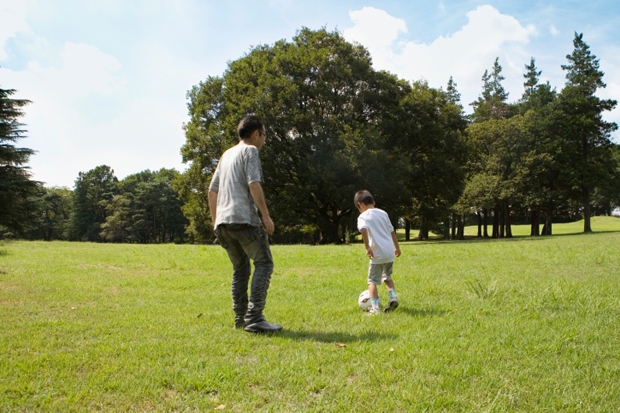On Sunday morning, I was kicking a football in the back garden with my grandson. I had bought him his first pair of football boots, Optimum Tribals, junior size 11, blue and orange, each boot furnished with six very adult-looking steel studs: four on the sole, two at the back of the heel. We were shirtless.
With a football at his feet and his shirt off, my grandson is transformed from an intelligent, biddable boy who is perhaps overly concerned with questions of right and wrong into an arrogant, argumentative liar given to pettish sulks. He tackles like a terrier gone berserk during a rat hunt. It wasn’t long before I was rolling around on the grass clutching my ankle bone after a two-footed studs-first challenge. I sat up and rolled down my sock to inspect the damage. And as I fingered the bruise, quite out of the blue I remembered that I had cancer.
It’s been just over two years since I sat opposite the urology consultant, Mr Mason, and watched his lips form the dread words ‘cancer’, ‘highly aggressive’, ‘spread’ and ‘lymph nodes’. And I panicked, I don’t mind admitting it. For several weeks, mentally, I was Corporal Jones with an unexploded bomb stuffed down the front of his trousers. I assumed that that was it — curtains — and I pictured myself lying in a bed with the lights going out one by one. I prayed not that I’d live (there are limits to my presumption), but that whatever happened I would set a good example to the children.
A week or two after my chat with Mr Mason, I met my oncologist for the first time. She was calm and reassuring and she had a plan. We were going to ‘throw the kitchen sink’ at the cancer in my pelvis, she said, and we were simply going to hope that the slightly enlarged lymph node in my aortic region was merely a freak. This sounded to me like an excellent plan. But even before we started throwing the kitchen sink at the cancer, my mental attitude towards the possibility of my being brown bread in short order inexplicably turned around. I stopped panicking and in spite of myself felt more cheerful than I had done for years. The rhythm and blues guitarist Wilko Johnson and I were diagnosed with cancer at about the same time. I was hoping to find him in the same rowing boat as we crossed the Styx. His was pancreatic cancer and he was given ten months to live. He went on breakfast telly claiming that his diagnosis had made him so inexplicably joyful that he had caught himself thinking that it was ‘almost worth it’.
Same here. I found that I’d never been happier. Everything became a lot simpler. I could stop worrying about the future, for a kick off. And I was 57, for crying out loud. To my 20-year-old self, 56 would have looked unforgivably old. This perspective was reinforced the day I had to collect my tablets from the cancer ward and saw children. And it was around this time, too, that the build-up to the centenary of the start of the first world war began, and I was reminded daily of the hundreds of thousands of lads in their teens and early 20s blown to bits on the Western Front. Yes, I’ll take 56 all day long, I thought.
I live in a part of Britain popular with tourists. One day I was crossing a small seaside park and gardens to get to the cashpoint. Three coaches had pulled up and decanted the occupants, all elderly, into the park, and it was packed with infirm, deaf, myopic, white-haired people with sticks and frames or being pushed in wheelchairs. As I dodged my way through this doddery mob, it struck me how every single one of them looked either bored or utterly miserable, and the thought that I was going to be spared this exalted me further.
As good as her word, my oncologist threw the kitchen sink at it: brachytherapy, radiotherapy, hormone injections and the ‘exciting’ new cancer drug abiraterone. From the wilder and whackier shores of homeopathic medicine, and pretty much at random, I picked iodine, which I smeared over my lower stomach from time to time as a sort of punt on the outsider in the Grand National. But never for a moment did I hope or expect to be cured. It was only a matter of time, I assumed, before my cancer would fight back and do for me.
After two years, I can now go for days at a time without reminding myself that I have cancer. And then, at incongruous moments like this one, as I sat on the grass rubbing my ankle, I suddenly remember it. ‘Foul!’ I shouted. ‘Rubbish! You tripped over the ball,’ Oscar shouted back.







Comments